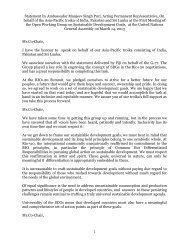STATE OF THE WORLD'S CITIES 2012/2013 Prosperity
STATE OF THE WORLD'S CITIES 2012/2013 Prosperity
STATE OF THE WORLD'S CITIES 2012/2013 Prosperity
You also want an ePaper? Increase the reach of your titles
YUMPU automatically turns print PDFs into web optimized ePapers that Google loves.
Chapter 2.1<br />
Productivity and the<br />
<strong>Prosperity</strong> of Cities<br />
Enhancing urban productivity is clearly desirable, as it<br />
improves competitiveness and, ultimately, the prosperity of<br />
any city. More productive cities are able to increase output<br />
with the same amounts of resources, generating additional<br />
real income that can raise living standards through more<br />
affordable goods and services. More specifically, the<br />
extra income and municipal revenue generated through<br />
productivity will enable any city to provide more, better<br />
services, such as housing, education and health services,<br />
social programmes and expanded infrastructure networks<br />
to support both productive and leisure activities.<br />
Urban productivity refers to the efficiency with which<br />
a city transforms inputs into outputs. However, because<br />
of limited data, gross domestic product (GDP) per capita<br />
is commonly used as a proxy for urban productivity, with<br />
a city’s GDP measuring<br />
local production of<br />
Raising urban goods and services and<br />
POLICy productivity<br />
the population serving<br />
is not a goal in itself, but<br />
a critical starting point<br />
as a proxy for inputs<br />
to provide residents with related to human capital.<br />
decent income for their<br />
However, it is important<br />
basic needs and adequate to emphasize that, despite<br />
living standards. its expediency, GDP<br />
1<br />
POLICy<br />
Cities are naturally more productive than rural areas,<br />
as they benefit from larger pools of labour and talent,<br />
together with concentration efficiencies for both producers and<br />
consumers, and a more fluid exchange of ideas and innovations. 2<br />
36<br />
per capita fails fully to reflect the complex dynamics<br />
determining urban productivity.<br />
RISING URBANIzATION AND INCREASING<br />
PRODUCTIvITy<br />
As countries become more urbanized, both urban<br />
and national productivity will increase. As shown in<br />
Figure 2.1.1, rising urbanization and per capita income<br />
went hand in hand for the world as a whole over the<br />
past five decades. While the share of urban populations<br />
worldwide increased from 33 to 51 per cent between 1960<br />
and 2010, per capita income increased by 152 per cent –<br />
from USD 2,382 to USD 6,006 – over the same period. 4<br />
However, as shown in Figure 2.1.2, the positive link<br />
between urbanization and national productivity holds<br />
mainly for high- and middle-income countries, signaling<br />
healthy urbanization dynamics fueled by prosperous<br />
cities acting as magnets for rural migration. Low-income<br />
countries display a more mixed trend. While these countries<br />
as a whole experienced a fast pace of urbanization from<br />
1960 onward, GDP per<br />
capita remained largely<br />
unchanged, and even<br />
In OECD<br />
decreased, particularly FACT countries, the<br />
between 1970 and the<br />
GDP per capita is, on<br />
year 2000. This would<br />
average, 64 per cent<br />
higher in towns and<br />
suggest that, rather than<br />
cities than in rural<br />
being attracted by better<br />
areas. Similarly, in<br />
economic opportunities<br />
European cities with<br />
in urban areas (demand<br />
populations over<br />
pull’), rural migrants<br />
one million, average<br />
were only seeking refuge<br />
GDP per capita is<br />
25 per cent higher than<br />
from famine, war or other<br />
in the EU as a whole,<br />
calamities in what is often and 40 per cent higher<br />
referred to as ‘supply push‘ than that of their home<br />
nations. 3<br />
urbanization. 5



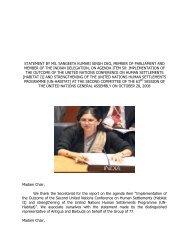
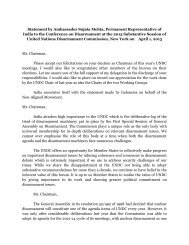
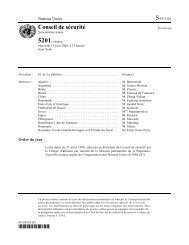
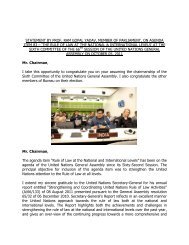
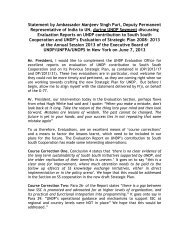
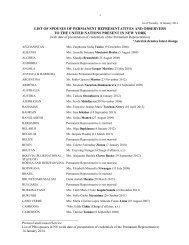
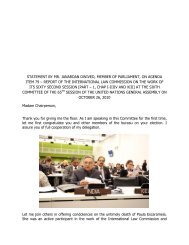
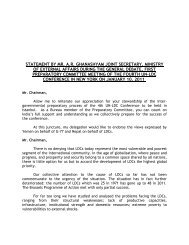

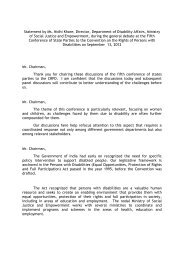
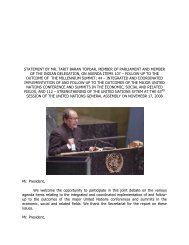
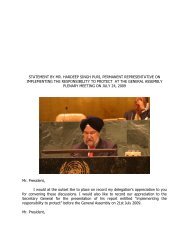
![1 statement by dr.[mrs] kakoli ghosh dastidar - Member States Portal](https://img.yumpu.com/27526598/1/190x245/1-statement-by-drmrs-kakoli-ghosh-dastidar-member-states-portal.jpg?quality=85)
